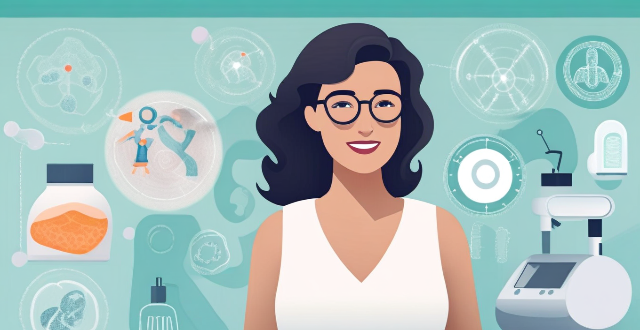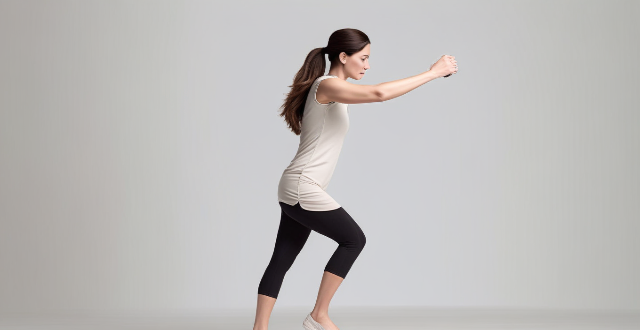Health Women

What regular health check-ups should women prioritize ?
As women, prioritizing regular health check-ups is crucial for maintaining good health and preventing potential health issues. Key components of the annual wellness visit include medical history review, physical examination, vaccination updates, and screenings such as mammograms and colonoscopies. Mammograms are essential for breast cancer screening in women over the age of 40, while Pap tests and HPV tests are used to screen for cervical cancer. Colorectal cancer screening is important for both men and women starting at age 50. By focusing on these regular health check-ups, women can take proactive steps towards a healthier life.

How can women maintain bone health as they age ?
Maintaining bone health is crucial for women as they age. Here are some tips to help them keep their bones strong and healthy: 1. Get Enough Calcium and Vitamin D: Women should aim to get at least 1,200 milligrams of calcium per day through food sources like dairy products, leafy greens, and fortified foods. Vitamin D helps the body absorb calcium, and it's recommended that women get at least 600-800 IU of vitamin D daily from sunlight, food, or supplements. 2. Engage in Weight-Bearing Exercises: Weight-bearing exercises like walking, jogging, dancing, or lifting weights can help strengthen bones by putting stress on them. This stress signals the body to build more bone, making them stronger over time. Aim for at least 30 minutes of weight-bearing exercise most days of the week. 3. Practice Good Posture and Body Mechanics: Good posture and body mechanics can help prevent fractures by reducing the risk of falls. Stand tall with your shoulders back and your head held high. Use proper body mechanics when lifting heavy objects, bending, or reaching overhead. 4. Quit Smoking and Limit Alcohol Intake: Smoking has been linked to decreased bone density and an increased risk of fractures. If you smoke, consider quitting to improve your bone health. While moderate alcohol consumption may not harm bones, heavy drinking can lead to bone loss. Stick to no more than one drink per day for women. 5. Talk to Your Doctor About Bone Health: As women age, it's important to discuss bone health with a healthcare provider. They may recommend a bone density test to assess your risk of osteoporosis and suggest lifestyle changes or medications if needed. If you have a family history of osteoporosis or other risk factors, your doctor may recommend starting bone-building medications earlier rather than waiting until menopause or later life stages.

How can we address the stigma surrounding mental health in women ?
Summary: Addressing the stigma surrounding mental health in women requires a comprehensive approach involving education, awareness, and advocacy. Public education campaigns can help demystify mental health, while school programs can teach young girls that it's okay to seek help. Corporate training and media representation can also play a role in changing public perception. Support groups, mental health advocates, government policies, and employer policies can provide support and resources for women struggling with mental health issues. By working together, we can create a society where women feel comfortable discussing their mental health and seeking help without fear of judgment or discrimination.

How important is hydration in maintaining women's health ?
Proper hydration is crucial for women's health, affecting body temperature regulation, joint lubrication, digestion and nutrient absorption, waste elimination, skin health, weight management, and support during pregnancy and breastfeeding. It is recommended that women drink at least eight glasses of water per day, with individual needs varying based on age, activity level, and climate.

How can a balanced diet contribute to women's health ?
A balanced diet is crucial for women's health, providing essential nutrients, supporting reproductive health, managing weight, preventing chronic diseases, enhancing mental well-being, promoting bone and digestive health, and improving skin and hair health. By incorporating a variety of food groups, women can ensure optimal physical and mental well-being across their lifespan.

What precautions should women take during menstrual health care ?
Women should maintain good hygiene, use appropriate sanitWomen should maintain good hygiene, use appropriate sanithydrated, exercise regularly, use appropriate sanitary products, stay hydrated, exercise regularly, manage stress, eat a healthy diet, and seek medical help when needed during menstrual health care.

How do women's health and education projects address global disparities ?
Women's health and education are crucial for global development, affecting communities' well-being. Women's health projects ensure access to quality healthcare services, including prenatal care and family planning. Education initiatives promote gender equality by increasing girls' enrollment rates and eliminating classroom biases. Economic empowerment projects provide job training and microfinance loans to women entrepreneurs. These efforts create a more equitable world where everyone can thrive.

How does nutrition impact women's mental health ?
Nutrition has a significant impact on women's mental health. Eating a balanced diet with adequate amounts of vitamins, minerals, and nutrients can help improve mental health. Avoiding processed foods and sugary drinks, drinking enough water, eating breakfast regularly, and getting enough sleep are also essential for good mental health. By taking care of their bodies through nutrition, women can take care of their minds.

What are the benefits of regular breast exams for women's health ?
Regular breast exams are crucial for women's health, offering early detection of breast cancer, improved awareness, reduced anxiety, opportunities for education, and promotion of preventive care. It is vital for all women to prioritize these exams as part of their overall health care routine.

What role does reproductive health play in overall women's wellness ?
Reproductive health is a crucial aspect of overall women's wellness. It encompasses the physical, emotional, and social well-being related to the reproductive system. Some key aspects of reproductive health include menstrual health, pregnancy and childbirth, contraception, screening and prevention, self-esteem, mental health, relationships, education and empowerment, access to care, and gender equality. By addressing these various aspects of reproductive health, we can ensure that women lead healthy, fulfilling lives both physically and emotionally.

Can hormone imbalances contribute to mental health problems in women ?
Hormonal imbalances can contribute to mental health problems in women by disrupting mood, emotions, and cognitive processes. Common issues related to hormonal imbalances include premenstrual dysphoric disorder, postpartum depression, and mood changes during perimenopause and menopause. Treatment options may include hormone therapy, antidepressants, and lifestyle changes.

What are the effects of domestic violence on women's mental health ?
Domestic violence has severe and long-lasting impacts on women's mental health, including depression, anxiety, post-traumatic stress disorder (PTSD), and substance abuse. It is crucial for healthcare providers to screen for signs of domestic violence and provide appropriate support services for affected women.

What are the impacts of climate change on women's health and well-being ?
Climate change is a global issue that affects everyone, but its impacts are not distributed equally across all populations. Women are often disproportionately affected by climate change due to their roles in society and their biological differences from men. This essay discusses the various ways in which climate change can have negative impacts on women's health and well-being, including extreme weather events, food security and nutrition, water scarcity, reproductive health, and mental health. It is essential that we take action to mitigate the effects of climate change and ensure that all people, regardless of gender, can live healthy and fulfilling lives.

What are the recommended daily allowances of vitamins and minerals for women ?
Vitamins and minerals are crucial for maintaining good health, and women have specific nutritional needs. The recommended daily allowances (RDA) of vitamins and minerals for adult women include various amounts of vitamins A, C, D, E, K, B-complex vitamins, and minerals such as calcium, iron, magnesium, phosphorus, potassium, zinc, copper, manganese, selenium, iodine, chromium, molybdenum, fluoride, and boron. These values are based on the average requirements of healthy adult women but may differ based on factors such as pregnancy, breastfeeding, age, and overall health. It's best to consult with a healthcare professional or registered dietitian to determine individual nutrient needs.

How can women ensure they are getting enough calcium in their diet ?
Calcium is crucial for women's health, especially for maintaining strong bones and teeth. Women can ensure they are getting enough calcium by knowing their requirements, including calcium-rich foods in their diet, considering supplements if needed, and maintaining a healthy lifestyle with regular exercise and limited alcohol consumption. It's important to consult with a healthcare professional for personalized advice.

What are the benefits of having a higher level of scientific literacy among women ?
The article discusses the advantages of having a higher level of scientific literacy among women. It highlights how it leads to improved health outcomes, economic empowerment, environmental sustainability, social progress, and global impact. Women with strong scientific literacy are more likely to make informed healthcare decisions, pursue careers in STEM fields, engage in environmentally responsible behaviors, challenge traditional gender roles, and contribute to solving global issues. The benefits of enhancing women's scientific literacy are vast and far-reaching, making it a key component of our collective efforts towards creating a more equitable world where everyone has access to quality education and opportunities.

How can we promote self-care and self-love for women's mental health ?
Promoting self-care and self-love for women's mental health requires a comprehensive approach that includes creating awareness, providing resources, and establishing supportive environments. This involves understanding the importance of mental health, dispelling misconceptions, normalizing conversations, providing accessible information, offering therapeutic support, building community networks, implementing workplace initiatives, advocating for policies, encouraging mindfulness and meditation, promoting healthy lifestyle habits, and fostering self-reflection and growth. By adopting these strategies, we can empower women to take charge of their mental health and lead fulfilling lives.

How does climate change disproportionately affect women in developing countries ?
Climate change disproportionately affects women in developing countries due to socio-economic factors, cultural norms, and division of labor. Impacts include reproductive health issues, nutritional deficiencies, loss of traditional occupations, increased workload, water scarcity, and energy poverty. Adaptation and mitigation efforts should involve women in decision-making and build their capacities. Gender-sensitive policies and interventions are needed to address these challenges and promote a more equitable future.

How does scientific literacy among women affect their decision-making abilities in healthcare and environmental issues ?
The level of scientific literacy among women significantly influences their decision-making abilities in healthcare and environmental issues. Scientifically literate women are better equipped to access, understand, and critically evaluate health information, leading to healthier lifestyle choices and more effective communication with healthcare providers. They also show greater awareness of environmental issues and are more likely to adopt sustainable practices, engage in conservation efforts, and advocate for evidence-based policies. Enhancing scientific literacy among women is crucial for empowering them to make well-informed choices that benefit both their own health and the environment.

What are the long-term consequences of untreated mental health conditions in women ?
The text discusses the severe and long-lasting consequences of untreated mental health conditions in women, which can affect their overall well-being, relationships, and quality of life. These consequences can be physical, emotional, and social, and they often compound over time. The most significant long-term effects include increased risk of chronic diseases, compromised immune system, sleep disorders, escalation of symptoms, self-medication, suicidal thoughts and behaviors, strained interpersonal relationships, workplace challenges, financial difficulties, reduced life satisfaction, limited participation in activities, and poor self-esteem. It is essential to recognize that these conditions do not improve over time without intervention and instead worsen, causing a ripple effect that touches every aspect of a woman's life. Early detection and treatment are crucial for managing mental health disorders effectively and preventing these long-term consequences. Seeking support from professionals such as therapists, psychiatrists, or counselors can provide the necessary tools and resources to address mental health concerns and improve overall well-being.

What are the best practices for women's health maintenance ?
The text outlines best practices for women's health maintenance, emphasizing regular check-ups and screenings, healthy eating habits, physical activity, mental health care, reproductive health, preventive measures, and lifestyle choices. The article suggests annual wellness visits, pap smears and HPV tests, mammograms, breast self-exams, a balanced diet with plenty of water and limited processed foods, regular exercise including strength training and flexibility exercises, stress management, adequate sleep, social support, professional help for mental health concerns, discussion of birth control options, menstrual hygiene, pregnancy care, staying up to date on immunizations, sun protection, safe sex practices, limiting alcohol, avoiding smoking, and steering clear of illicit drugs. These recommendations are intended to help women maintain their health and wellbeing throughout their lives, with the caveat that individual circumstances and needs should guide healthcare decisions in conjunction with professional advice.

How does work-life balance impact women's physical health and well-being ?
The article discusses the impact of work-life balance on women's physical health and well-being, highlighting the following key points: 1. **Stress and Mental Health**: Work-life imbalance can lead to chronic stress, weakening the immune system and increasing the risk of mental health issues like anxiety and depression, which in turn can cause physical health problems. 2. **Physical Health**: An unbalanced lifestyle often results in a sedentary lifestyle and poor eating habits, leading to weight gain, obesity, and an increased risk of chronic diseases. 3. **Reproductive Health**: Excessive stress and unhealthy lifestyle habits can affect women's reproductive health, causing menstrual irregularities, infertility, and complications during pregnancy. 4. **Quality of Life**: Work-life imbalance can significantly impact a woman's quality of life, leading to feelings of dissatisfaction, reduced productivity, and strained relationships. Maintaining a work-life balance is crucial for ensuring that women's physical health and overall well-being are not compromised.

What are the best ways to manage anxiety and depression in women ?
The text discusses several strategies for managing anxiety and depression in women, emphasizing the importance of seeking professional help, practicing self-care, building a support network, making lifestyle changes, and considering medication. It highlights different types of therapy and medical professionals to consult, as well as various self-care practices like exercise, mindfulness meditation, and journaling. The article also touches on the significance of social connections and time management in managing mental health. Finally, it provides information on antidepressants and stress reduction techniques, advising readers to work closely with healthcare professionals to find the best approach for their needs.

How can counseling help women dealing with infertility-related stress ?
Counseling is crucial for women dealing with infertility-related stress. It helps identify emotional distress, address mental health concerns, build resilience and coping strategies, navigate medical treatment options, and foster hope and healing. By providing emotional support and promoting self-care practices, counseling empowers women to face the challenges of infertility with strength and courage.

How do women-specific NGOs measure their impact on reducing poverty and inequality ?
This article explores how women-specific NGOs measure their impact on reducing poverty and inequality by focusing on key metrics such as economic empowerment, education and skill development, health and well-being, and gender equality and empowerment. It also highlights successful NGOs like Women's World Banking, Room to Read, and International Planned Parenthood Federation (IPPF) that use data collection tools to track progress towards their goals.

In what ways does mental health support impact overall women's health ?
This text discusses the importance of mental health support for women's overall health, highlighting its impact on physical health, emotional well-being, relationships, and work performance. It emphasizes that good mental health can reduce the risk of chronic diseases, improve sleep quality, and help manage pain. Additionally, it mentions how mental health support can enhance emotional well-being by reducing stress, improving mood, and increasing resilience. The text also points out that mental health support can strengthen relationships through improved communication, better emotional regulation, and greater empathy. Lastly, it notes that mental health support can enhance work performance by improving focus, reducing absenteeism, and increasing job satisfaction.

How much exercise is recommended for pregnant women ?
Pregnant women are advised to engage in at least 150 minutes of moderate aerobic activity weekly, like brisk walking or prenatal yoga, for benefits including improved cardiovascular health and reduced back pain. Safety precautions include avoiding overheating and contact sports, staying hydrated, and modifying activities as pregnancy progresses. Always consult with your healthcare provider before starting any new exercise program during pregnancy.

How does stress affect women's mental health ?
This text discusses the effects of stress on women's mental health, including anxiety and depression, sleep disturbances, emotional eating, low self-esteem, difficulty concentrating, irritability and mood swings, substance abuse, and physical health issues. It emphasizes the importance of self-care practices to manage stress effectively.

How can I create a fitness plan specifically for women ?
Creating a fitness plan for women involves understanding their unique physical and physiological needs. Tips include setting realistic goals, incorporating strength training and cardiovascular exercises, considering hormonal cycles, staying hydrated and fueling the body properly, and seeking professional guidance when needed. By following these tips, women can achieve their fitness goals and improve their overall health and well-being.

How does menstrual cycle affect women's mental health ?
The menstrual cycle can affect women's mental health by causing mood swings, low self-esteem, changes in appetite, fatigue, and psychological symptoms. To manage these changes, it is important to stay hydrated, get enough sleep, exercise regularly, practice mindfulness and relaxation techniques, and seek support from healthcare providers and loved ones.